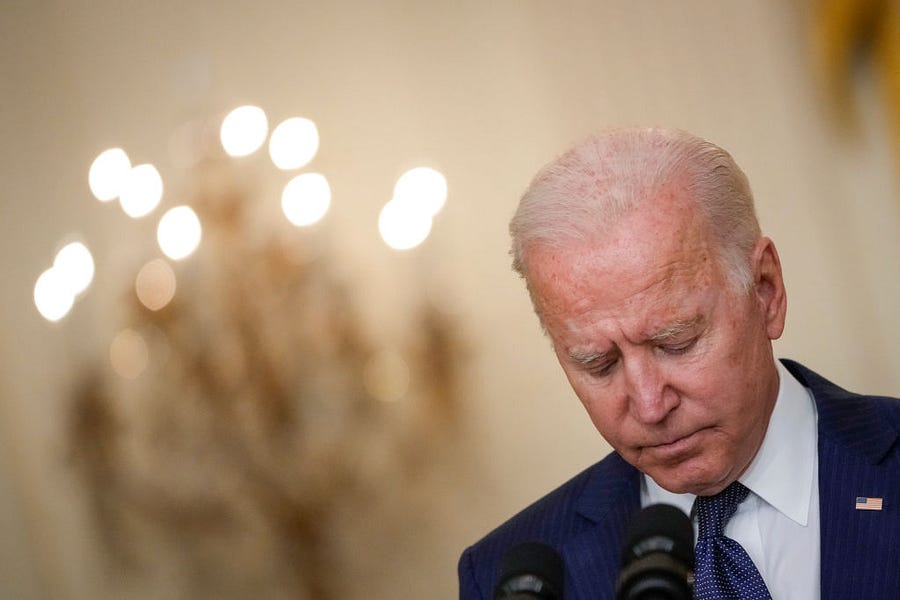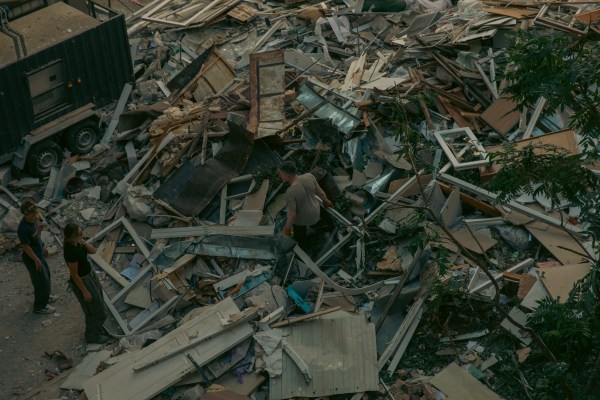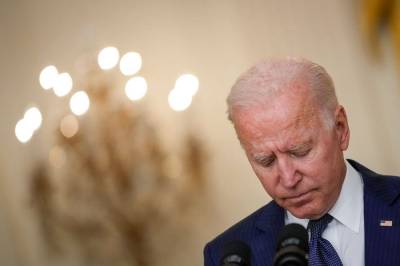The attacks Thursday at the Hamid Karzai International Airport in Kabul, Afghanistan, killed 13 U.S. troops, making it the deadliest single day of the war for Americans in more than a decade. More than 90 Afghans trying to escape a return to Taliban-ruled Afghanistan also died. Losing Americans is always tragic, but losing them in the process of a chaotic capitulation is unforgivable. And that’s what the incompetence and hubris of the Biden administration has produced.
When President Joe Biden addressed the country after the attacks, he offered somber and appropriate gratitude for the sacrifices of our servicemembers. But as he has so many times over this crisis of his own making, Biden also offered politically self-serving distortions that spun the reality of the unfolding crisis to a point that it was almost unrecognizable. He celebrated “an airlift and evacuation effort unlike any seen in history,” as if the chaotic retreat of American forces were a moment of triumph. He said “this is the way [our mission] was designed to operate, operate under severe stress and attack,” as if it was all part of the plan. He pledged that “these ISIS terrorists will not win” and emphasized that they are “an archenemy of the Taliban,” an awkward attempt to contrast the jihadists who conducted these attacks with the jihadists his administration is relying on as the U.S. military’s new counterterrorism partner.
It’s an absurd proposition. But the Biden administration—out of naivete, desperation or both—is determined to test it. Politico reported Thursday that the U.S. government provided the Taliban with “a list of names of American citizens, green card holders and Afghan allies to grant entry into the militant-controlled outer perimeter of the city’s airport.” This is the same Taliban whose deputy leader, Siraj Haqqani, has a $10 million bounty on his head from the State Department’s Rewards for Justice program. The same Taliban that has harbored al-Qaeda for more than two decades, helping those terrorists lay the groundwork for the 9/11 attacks and the war they knew would follow. The same Taliban that freed thousands of imprisoned jihadists—from ISIS, from al-Qaeda—as it took the country. The same Taliban responsible for the deaths of Americans in Afghanistan by the hundreds. The same Taliban that controls access to the airport and the very gates where ISIS terrorists were able to detonate their bombs. The enemy of our enemy is not our friend, no matter how much our leaders might wish it were so. The enemy of our enemy is our enemy.
Contrary to a common claim, the invasion of Afghanistan was never a “war of choice.” Politically, strategically, and morally, Congress and the president had as much choice to respond militarily after the attacks of September 11, 2001, as their predecessors did in 1941 after the attack on Pearl Harbor. We cannot dispute that the two-decade war effort was subject to deplorable mission creep and mismanagement. But it is no less indisputable that what we’ve witnessed over the course of Afghanistan’s cruelest summer is a defeat of choice.
It did not have to be this way. We opposed complete withdrawal from Afghanistan, but people of good faith in both parties supported it. Nonetheless, no one had this in mind, including the Biden administration itself—that is, if the president was telling the truth about how he believed this would play out. In his July 8 announcement of an August 31 deadline for American withdrawal, Biden and his national security team insisted that this would be nothing like the fall of Saigon. The two operations were, in Biden’s words, “not at all comparable.”
Instead, in recent days, the Biden administration and its defenders have been peddling the idea that our operation in Afghanistan is a triumph of America’s can-do spirit, comparable to the Berlin airlift. It is not. The Berlin airlift involved shipping food, fuel, and clothing into an area illegally captured by our enemies, on the grounds that America would defend our allies in West Berlin against totalitarian aggression and enslavement. The Kabul airlift involves the rescue of people, American and Afghan, from totalitarians bent on enslaving much of their own people— totalitarians to whom we have surrendered.
Sadly, Saigon is an instructive analogue, and the Biden administration is not shining by comparison. The South Vietnamese government survived for 25 months after the evacuation of U.S. combat troops and most Americans. Kabul fell 38 days after President Biden promised this would be nothing like Saigon. The president, in a spate of defensive and morally reprehensible statements, blamed the speed of the Taliban’s military victory over the United States and her allies on one of those allies—the Afghan government and army.
What the president did not mention in his haste to shift blame to the Afghans was that our premature withdrawal of military support left the Afghan army virtually inoperable. When we stopped American air support—without warning—and halted all logistical assistance, it was like cutting off a diver’s air supply. But the president opted to explain the asphyxiation of the Afghan war effort on Afghan cowardice. Cowardice was on display, but not on the part of an Afghan army that lost tens of thousands fighting—and not just on behalf of their country, but on behalf of ours.
That is the most crucial factor here. The Taliban is not some autarkic Islamist Brigadoon shrouded in the mists of the Hindu Kush, determined to live in hermit-like isolation, satiating itself with purely domestic barbarity. It is a terrorist organization, full stop. Those trying to forecast how the politics of this debacle will play out often say we need to “wait and see” if al-Qaeda “moves back into Afghanistan.” Al-Qaeda never left. As our own Tom Joscelyn has been chronicling literally for two decades, al-Qaeda is essentially the foreign legion of the Taliban. It has never renounced al-Qaeda. How could it? The Taliban’s leadership is intertwined with al-Qaeda’s, its members connected not just by ideology but by profitable businesses, faith, and even blood. Ayman al-Zawahiri, al-Qaeda’s top leader, has sworn bayat—an oath of loyalty—to successive Taliban leaders.
The best case for leaving some American troops in Afghanistan was never grounded in talk of “nation building” or love of “forever wars,” but in America’s core national security interest. Preventing the Taliban from taking over Afghanistan is in our interest because the Taliban is our enemy. Politicians in both parties, with precious few exceptions, have refused to tell this hard truth to the American people.
This is why the happy talk of the previous administration—including delusional promises from former Secretary of State Mike Pompeo that the Taliban would fight side-by-side with us to “destroy” al-Qaeda—was so insulting to our intelligence. And it is why the current administration’s insistence that the Taliban will change its ways because it’s in its interest to be a member in good standing in the “international community” is so preposterous. Even if we took such wishcasting seriously, it’s clear after the horrific bombings on Thursday that the Taliban is incapable of preventing terrorist attacks on its own soil from rival terrorist groups. If a barbaric totalitarian regime can’t be relied on to police its internal enemies, why should we trust it to police its internal allies?
But we do not believe that the Taliban can be our partners in peace any more than we believe the jihadists have changed their ways—beyond being more sophisticated at propaganda and duping useful idiots in the West. The day before the attacks on the Kabul airport, the chief Taliban spokesman told NBC News that Osama bin Laden wasn’t involved in the September 11 attacks. The Taliban also declared a ban on music and announced that women will have to be kept locked up at home because the Taliban’s troops have “not been trained” to “respect” women. If these are the policies the “moderate” Taliban is willing to implement when our troops are still on the ground, we shudder to think what will come after we leave.
Our case for remaining wasn’t about “nation-building,” but let us acknowledge that building a somewhat decent, falteringly democratic, society that let women get an education or a job was an ancillary moral and strategic benefit of protecting America and her interests. And even if you do not care about such things, hundreds of thousands, if not millions, of Afghans did. They cast their lot with us. Now those stranded souls—who understand the Taliban better than any expert in the Biden administration or pundit on cable TV—are shoving their babies over barbed-wire fences and hiding in the wheel wells of American planes. They aren’t merely “voting with their feet”—they’re voting with their lives, and the lives of their children.
The Biden administration has repeatedly insisted that any withdrawal of this kind would involve “some chaos”—as if acknowledging the inevitability of “some chaos” exonerates any amount of chaos and humiliation at the hands of the Taliban or other terrorist groups in Afghanistan. And that is what is so infuriating and heartbreaking. It didn’t have to be this way. If we had continued supporting the Afghan military with a small residual force as part of our counterterrorism strategy, the government could have hung on long enough to at least make an orderly withdrawal possible. If the Trump or Biden administrations had delayed the departure date until winter, when the Taliban returns to Pakistan to wait out the snows and bring in its poppy crops, we would have had the strategic space to avoid unfavorable comparisons to Saigon.
But the Biden administration, like its predecessor, was so committed to political calculations rather than strategic ones that we’re left with an open-ended humiliation on the international stage, a potential hostage crisis, and, if early reports are true, more dead American servicemembers than we’ve lost in combat in the last two years of this so-called “forever war.”
The question facing the Biden administration and Congress is: What now? The Afghan larder has been bereft of good options for years. All that is left now is to choose between competing terrible ones. The least worst of those is for the United States to announce there will be no deadline for the safe evacuation of Americans and those who worked alongside us over these past two decades. There is a risk that this will anger the Taliban, which—having seized control of so much of the country—feels so emboldened to declare that a U.S. troop presence beyond August 31 would cross some kind of “red line.” It’s a risk worth taking. The United States should never have been in the position of taking orders from the Taliban. And we ought to make clear that we will extract every last American—and every last Afghan ally—no matter the cost. Perhaps this would mean retaking Bagram Air Base, which the U.S. inexplicably gave up in the dead of night—the beginning of our shameful pullout. It could mean surging troops to ensure a withdrawal on our terms, consistent with our values.
Biden has made clear over these past few weeks that he has no strategy for Afghanistan other than leaving it. When his top advisers speak of finishing the mission there, they mean nothing more than withdrawing all of our troops. But doing so—particularly in the incompetent manner the world has witnessed—will have consequences that will last decades. “That's one way to end a war: surrender,” said Ryan Crocker, former U.S. ambassador to Afghanistan. “It's real quick, but the war is yet to come. This whole withdrawal announcement and process has been an enormous morale boost for Islamic radicals everywhere.”
Joe Biden may believe he finally ended the “forever war” the jihadists started more than two decades ago. He’s mistaken. The jihadists are still fighting. And their victory in Afghanistan—where he chose defeat on our behalf—won’t be their last.






Please note that we at The Dispatch hold ourselves, our work, and our commenters to a higher standard than other places on the internet. We welcome comments that foster genuine debate or discussion—including comments critical of us or our work—but responses that include ad hominem attacks on fellow Dispatch members or are intended to stoke fear and anger may be moderated.
With your membership, you only have the ability to comment on The Morning Dispatch articles. Consider upgrading to join the conversation everywhere.